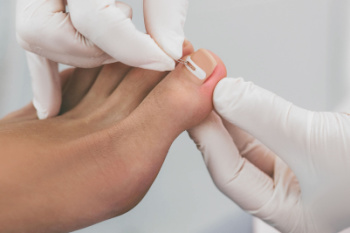Dallas (214) 340-8885
Athens (903) 677-9090
Gun Barrel City (903) 887-4341
Dallas (214) 340-8885
Athens (903) 677-9090
Gun Barrel City (903) 887-4341

Ingrown toenails occur when the edges of a toenail grow into the surrounding skin, causing pain, redness, and swelling. Certain activities, like ballet or football, can increase the risk of developing ingrown toenails. In ballet, the pressure from pointe work can cause the toenails to compress against the shoe, while football players often wear tight cleats that crowd the toes. These tight shoes, combined with repetitive movements, can lead to nail damage and ingrown toenails. Other causes include improper nail trimming such as cutting them too short or rounding the edges, injury, or genetic factors that make the toenails more prone to growing into the skin. If left untreated, ingrown toenails can become infected and lead to more serious complications. Visiting a podiatrist is key to proper diagnosis and treatment. This type of doctor can safely remove the ingrown nail, prevent or treat infection, and offer advice on proper nail care and footwear to avoid recurrence. If you have an ingrown toenail, it is suggested that you schedule an appointment with a podiatrist.
Ingrown toenails can become painful if they are not treated properly. For more information about ingrown toenails, contact Dr. Jonathan Kletz of Texas Foot Works. Our doctor can provide the care you need to keep you pain-free and on your feet.
Ingrown Toenails
Ingrown toenails occur when a toenail grows sideways into the bed of the nail, causing pain, swelling, and possibly infection.
Causes
Prevention
Because ingrown toenails are not something found outside of shoe-wearing cultures, going barefoot as often as possible will decrease the likeliness of developing ingrown toenails. Wearing proper fitting shoes and using proper cutting techniques will also help decrease your risk of developing ingrown toenails.
Treatment
Ingrown toenails are a very treatable foot condition. In minor cases, soaking the affected area in salt or antibacterial soaps will not only help with the ingrown nail itself, but also help prevent any infections from occurring. In more severe cases, surgery is an option. In either case, speaking to your podiatrist about this condition will help you get a better understanding of specific treatment options that are right for you.
If you have any questions please feel free to contact one of our our offices located in Dallas, Athens, and Gun Barrel City, TX . We offer the newest diagnostic and treatment technologies for all your foot and ankle needs.
Make sure you enter all the required information, indicated by an asterisk (*). HTML code is not allowed.